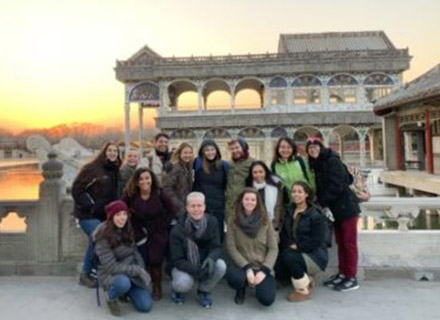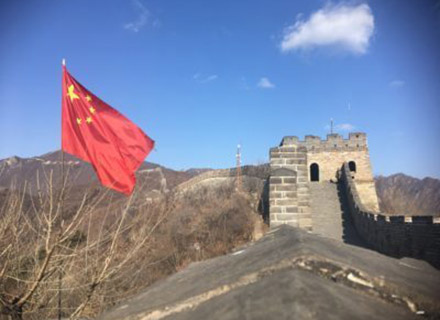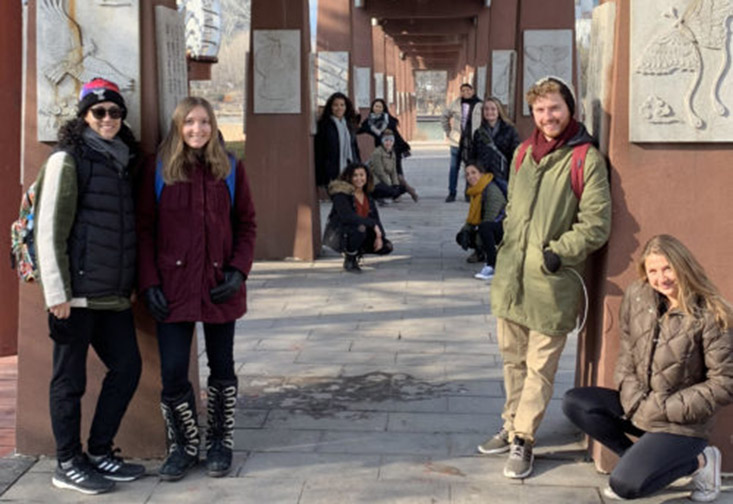During the academic calendar, winter break is usually a time for students to return home and rest between semesters. For 12 students in the Honors Program, this winter break provided them with the opportunity to fly across the world and immerse themselves in the history and daily life of China.
USF St. Petersburg students spent two weeks visiting world renowned cultural destinations like the Great Wall and the Temple of Heaven as well as the skyscraper-filled capital of Beijing.
But their home base was the provincial and rustic city of Weifang. Students spent their days taking classes on Chinese language, calligraphy and history at the University of Weifang and their nights connecting with peers and experiencing Chinese life first-hand.
“This was the best thing I have done in college thus far,” said junior Allison Senne, an environmental science and policy major. “We learned a lot about the nation’s history and current environmental issues, and the students we met there couldn’t have been nicer.”
“Weifang gets about 200 foreigners a year, so we were treated like rock stars,” added Naya Payne, a sophomore studying political science. “Whenever we went outside, people wanted to take pictures with us and really engage with us. They even threw me a surprise birthday party.”
The goal of the program was to fully immerse students in the China experience through classes covering a wide range of topics as well as social activities. Combining academics with social experiences gave these students a glimpse of what life is like in the developing global power.
“I was so happy with how open students were to new experiences, new food and new people they met throughout this trip,” said Dr. Thomas Smith, Professor of Political Science and Director of the USFSP Honors Program who led the education abroad trip. “You could see how eye-opening it was for each student and they walked away with a greater appreciation of Chinese culture.”

The opportunity was made possible through a cooperative agreement between USF St. Petersburg and Weifang University that was signed in 2017, which paved the way for internship opportunities, exchange programs and affordable abroad experiences like this. The connection with Weifang, traveling in the chilly month of December and additional scholarship money kept the travel price modest, which was a major selling point to many who went on the trip.
“I was always interested in China, but what really sold me on the opportunity was that the price was fantastic,” said Senne.
In addition to learning about recorded Chinese history stretching back 3,000 years and experiencing the Forbidden City and Tiananmen Square, students picked up practical knowledge from their Chinese counterparts.
“They would teach us how to haggle in supermarkets to get the best price,” said Senne.
Students also saw future opportunities for themselves in the country. In Weifang, they visited the AMERI-CAN International Academy and Behai College, where several recent USFSP graduates are currently teachers of English.
Since returning stateside, students and professor are reflecting on their international experience and differences between life in America and China.
“I only had a theoretical knowledge of China before this trip, so I was struck by how little activism there was for things such as local environmental cleanups, how there was surveillance nearly everywhere and how politics for the people was something that happened in Beijing, but not anywhere else in the country,” said Smith.

Students kept a journal on their personal experiences that they will submit for coursework. Each is also writing a research paper on a topic of interest. For Senne, she is focusing on the environmental issues China is facing, such as air pollution and deforestation.
“There were days we had to wear masks because the air pollution was so bad. They are trying to combat pollution, and students especially know it is bad and want to do something because they are concerned about the future of their home.”
But the biggest lesson learned, echoed by Payne, Senne and Smith, was the similarities between people of very different cultures.
“You really learn that you can connect with someone who is very different than yourself and that there is a whole world of people out there that are distinct and similar to us in America,” said Payne. “It gives you a unique perspective on your own culture and way of life.”
